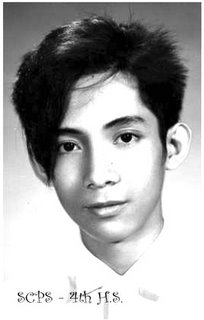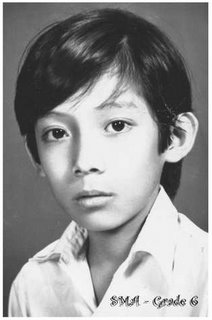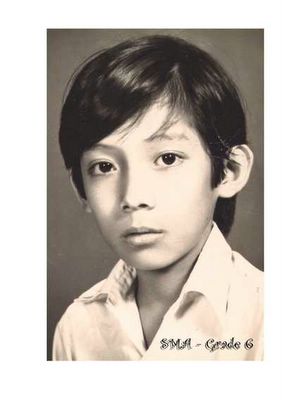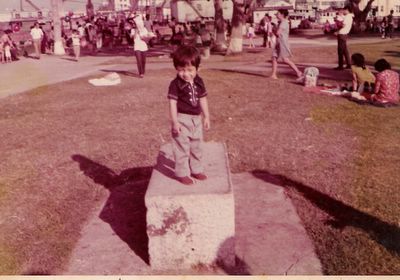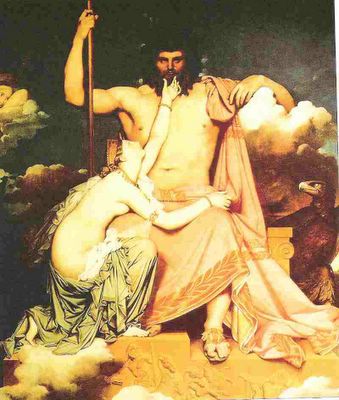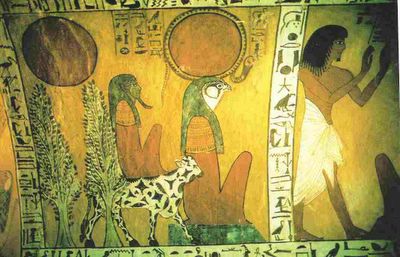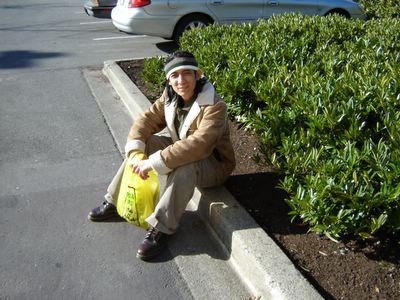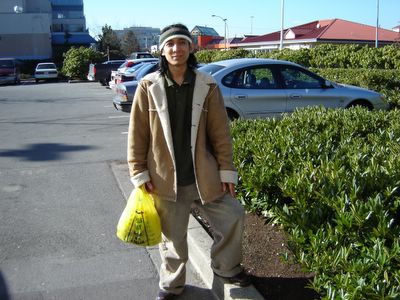Donut versus BagelA few days ago, we (Grandpa, cousin, niece, and I) ate lunch at a Tim Horton's, a donut shop which reminds me of Dunkin' Donuts in the Philippines. While ordering food, I got into a situation which made me realize that even a learnèd and well-read person like me is not free from stupidity once in a while. How pathetic, if I may add...
I ordered for the lunch combo that consisted of a mushroom soup, turkey sandwich, donut, and soda. While preparing the sandwich and the soup, the service staff asked me:
"What soda would you be having?"I said, "Dr. Peppers."
"How about the donut?""Ahmm," I muttered as I darted my eyes to the trays full of different-flavored donuts and other stuff. "Okay, I'll have a piece of that—strawberry bagel."
"Come again?" said the service staff.
I didn't know if my voice was, as usual, soft and inaudible because of my tendency to mumble—a tendency, I observed, common to foreigners from third-world countries who find themselves alone in a first-world country and who are still shaving off the remaining iotas of inferiority in their systems.
I replied, this time chin up and head high and with a louder and well-modulated voice (the way I always did in the Philippines when paying for my jeepney fare...
"Mama, bayad!"): "I will have a piece of
strawberry bagel."
The service crew looked at me with a puzzled face and said:
"Can't you see? That's not a donut; it's a bagel."Ha-ha-ha! I felt my blood rushing up my head. I was sure the lady saw how pink my face had become. But, gentle and compassionate as I am, I simply ignored her sarcasm. Besides, I wouldn't want to create a scene.
In an instant, I felt I was reduced back to my default state—a foreigner from a third-world country who finds himself alone in a first-world country and who is still shaving off the remaining iotas of inferiority in his system.
But, should the service crew blame me for my "stupidity," or should I say, "ignorance"? I could really feel her look of condescension. I would have reasoned, hey! sorry I didn't know; for I used to call almost any similar round bread with a hole in the middle
donut.
In fact, even the elongated ones (éclair) and the ones without a hole which are filled with jelly inside, many Filipinos refer to also as donuts.
I swear, that little piece of bagel could really pass as a donut, especially for me who am yet to discover, first-hand, many things where I am. I swear, that bagel surely looked like a donut—just bigger. But, yeah, it is round also, and it also has a hole in the middle.
Anyway, feeling pathetically reduced to a munchkin, I simply muttered, "Oh, well, a piece of that chocolate-filled donut then."
Back at my seat, I didn't care to tell my companions what happened at the counter. I thought, who cares; I wouldn't want to have another probable look of condescension.
Reflecting on this trivial yet sad plight of mine, I suddenly thought about what happened. Why did it happen? Then, the concept of
semantics popped up in my mind. I realized, the service crew could not blame me for having been "stupid" not to know the difference between a donut and a bagel. Why? Simply because I am new here where I am. Certainly, most of the things here, which to them are commonplace, are understandably new to me.
Semantically SpeakingSome
words or
things here, which in the Philippines pass as synonyms or even as "the same thing" are very distinct from each other. For instance, in the Philippines, try to show a cantaloupe and a honeydew to a common person and then ask her/him what fruit that is; that person would most probably simply answer:
"Ah, e di milón."Is s/he correct? Technically, yes, her/his answer is correct; because cantaloupe and honeydew are fruits belonging to the melon family. And, in the Philippines, the honeydew (with the green flesh) is a relatively new fruit as compared with the cantaloupe (orange flesh); besides, many Filipinos would not pay much attention whether the melon is a cantaloupe or a honeydew (except for the watermelon, or
pakwán)—which to them are:
"Ah basta, pareho lang milón yang dalawang 'yan; halos pareho naman ang lasa nila e."Acceptable? Of course, basically because cantaloupe and honeydew are varieties of melon anyway, so calling both of them
milón is technically correct after all. Besides, both fruits are not good representatives of the Philippines as compared with, say, bananas; so it's not a big deal. Which brings me to the topic of bananas...(Play background music: "Mick's Blessings" by Style Council [
Café Bleu; 1984, UK Polydor].)
In English, Refer to It as Banana Plant, not Banana Tree; but Yes, in Filipino, We Call It Punò ng SágingI now realized that here in Canada at least, many people regard cantaloupe and honeydew as two fruits very distinct from each other. You should not refer to them simply as melons; you have to be specific. When in a fruit store, you don't simply ask for melons; specify if what you're looking for is cantaloupe or honeydew; lest, you
might be given a look of condescension. Regardless if no one is safe from stupidity once in a while, nobody in her/his normal state of mind would want to be called stupid even only occasionally.
Okay, back to bananas...
The
language problem behind the donut-bagel or the cantaloupe-honeydew situation, nonetheless, is applicable to any other country anyway. Let's take banana for example...
In the Philippines most, if not all, people would not be content in referring to banana as simply
ságing. They will usually want to know
"anóng kláseng ságing? lakatán, latundán, sabá, señoríta..." chiefly because bananas are one of the most common and often-used fruits in the Philippines.
Make a fruit salad and you will surely need
lakatán; make a "bananacue" and you will need
sabá; eat lunch with a viand of
menúdo or
mechádo and you will most likely love to couple it with
latundán; and you may want to amuse a child with a
pilíng of
señoríta.But here where I am—where fruit salad–cum-bananas, "bananacue," and
minatamis na saging are foreign—they don't care much about such varieties of bananas. When they want bananas, they simply go to the fruit store and buy bananas. When they couldn't readily find the banana, they simply approach the service staff and ask where the bananas are. The service staff, in turn, simply either tells the customer that the store ran out of bananas or points to the section where s/he will find the bananas. No more asking
"What variety of
bananas—
lakatán, latundán, sabá, señoríta?" Role ReversalBaligtarin ko kaya ang sitwasyon? Halimbawa nagpunta sa Pilipinas yung service staff
na naistupiduhan sa 'kin dahil hindi ko alam na magkaiba pala ang bagel
at donut
. Tapos, gusto n'ya kumain ng banana
. Pumunta siya sa palengke (s'yempre mas adventurous
para sa kanya kung sa wet market instead of a grocery
s'ya pupunta), tapos hindi n'ya mahanap kung nasaan ang bilihan ng banana.
Naghanap s'ya ng mapagtatanungan...nagkataon namang ako ang kanyang naispatan..."Excuse me, where can I find the bananas?"
Eh, namukhaan ko s'ya. Sa isip ko, aha! ikaw yung service crew
sa Tim Horton's sa Canada na tiningnan ako nang nakapanliliit na tingin nung hindi ko alam na bagel
pala yung inakala kong donut
. Kaya, sinagot ko 'yung tanong n'ya ng kapwa tanong din...sabi ko..."Ahmm, what variety of banana are you looking for:
lakatán, latundán, sabá, señoríta?"
S'yempre malilito s'ya; malamang ay sabihin n'ya: "Just banana...any variety will do."
Kung kagaya n'ya 'ko na hindi marunong umintindi na karaniwan namang nararanasan ng kahit na sino— anupaman ang lahi o kultura n'ya—ang "ka-istupiduhan" o "kamangmangan" sa mga bagay-bagay sanhi ng semantics or language specifications
, e malamang sinagot ko na s'ya ng: "Can't you see? Bananas have different varieties; you should know which variety you are looking for!"
Pero dahil malawak ang pananaw ko, at mahaba ang pasensya ko, at maaalalahanin akong tao, sasamahan ko pa s'ya sa bilihan ng saging at ipakikilala nang maayos... "This one, the plump and thicker one, is
sabá; this, longer and whose skin is darker yellow,
lakatán; this, medium-sized and lighter yellow,
latundán; these, cute little ones with green skin,
señoríta."
Tapos, siguro naman magpapasalamat s'ya sa 'kin, at baka ayain pa ako..."Would you care to join me for dinner? Any suggestion for a nice place to eat?"
Ha-ha-ha! Yayayain ko sa Dunkin' Donuts o kung saan may bagel
. Ha-ha-ha!Teka nga pala...ano nga ba ang pagkakaiba ng donut
sa bagel
?Donut versus BagelAccording to my trusted Internet word reference:
dough·nut, also do·nut
n.
1. A small ring-shaped cake made of rich, light dough that is fried in deep fat. Also called olicook.
2. Something whose form is reminiscent of a ring-shaped cake.
ba·gel
n.
A glazed, ring-shaped roll with a tough, chewy texture, made from plain yeast dough that is dropped briefly into nearly boiling water and then baked.Leche! E halos pareho lang naman pala e. Naalala ko tuloy yung madalas kong bilhin sa Glorietta Activity Center, sa Pilipinas; may stall
doon na nagtitinda ng maliliit na "ring-shaped friedcake,"
na mini-donut
ang tawag ng karamihan. Pero teka, pansinin mo yung ikalawang kahulugan ng doughnut
. "Something whose form is reminiscent of a ring-shaped cake"!
E di, pwede rin palang tawaging doughnut
ang bagel
? Basta korteng singsing daw e. Hmmp! Pero sa isang banda, mas mainam na nga rin naman 'yung specifically correct
. Ang tatandaan ko mula ngayon: kapag sa kumukulong mantika inilubog, donut
; kapag sa kumukulong tubig, bagel
. Subalit ang hindi ko lang talaga matanggap ay 'yung asta 'nung service crew—
kung paano n'ya ako itinama. Hindi naman kasi mahirap tumanggap ng kamalian; basta ba maayos na pamamaraan ang ginamit sa pagwawasto sa iyong kamalian. Sa puntong 'yan sumesemplang ang maraming tao; ituturo nga sa 'yo ang tama, pero may bahid naman ng pangmamaliit; tipo bang ipinamumukha pa sa 'yo na "Oo, tanga ka nga, sa simpleng bagay e nagkakamali ka pa!"
Hay! Words!
Di bale, nagpapasalamat pa rin ako sa service crew
na 'yun ng Tim Horton's, dahil sa kanya I took the time to check the minute difference between a doughnut and a bagel
. Pati kahulugan ng éclair
ay inalam ko na rin.
And, from now on I'll be using the spelling
doughnut, because I follow the
Chicago Manual of Style's
rule concerning use of word variants: "when choosing between variants of a word, always opt for the first dictionary entry.
One More Triviaé·clair n.1. An elongated pastry filled with custard or whipped cream and usually iced with chocolate.2. oblong cream puffTherefore, éclair is not a doughnut; so the next time I go to a Dunkin' Donuts, I would no longer call my favorite éclair doughnut. I would simply say, "Kindly give me a piece of éclair."
Post Script [Pardon my indulgence. He-he-he.]Still goin' bananas, I decided to research about the numerous varieties of bananas. I then found out that even in the English language, there are specific names for every known variety of banana. [Of course, there should be names for every discovered species or variety of fruits—talk about
taxonomy.] Many people just don't go into these details, primarily because this is too ponderous and laborious; and if they do happen to know such, this most likely has something to do with the commonness of the fruit in question.
In countries where bananas are not a "priority fruit," many people don't really pay much attention to the varieties' names—they'd naturally prefer the general term—although each variety has its own name; and this is understandable, for they'd rather indulge in grapes or apples, which are among the most common fruits in North America.
In the Philippines, definitely, where—as every Filipino certainly knows—bananas are among if not the most common fruit, useful in some Filipino dishes (
pochéro) and many local delicacies
(halu-halò,
sabá-cum-yélo, fruit salad
), people tend to know the names of, at least, the commonest varieties
.Goin' BananasFor indulgence's and curiosity's sake, here are some interesting pieces of information about bananas.
1.
Bananas come in different varieties, which can be characterized by shape, color, and size.
2. North Americans are mostly familiar with these
types: the blunt-ended
Cavendish; the
Gros Michel, known by its tapered ends; the starchy
plantains, which is used only for cooking as a vegetable; the
dwarf or “
baby” bananas; and the
red bananas.
3. Edible bananas (genus
Musa) originated in the Indo-Malaysian region reaching to northern Australia.
4. The history of
banana, including its medicinal uses.
I wonder if there'd still be someone brave enough to challenge me about bananas. Hmmm.
